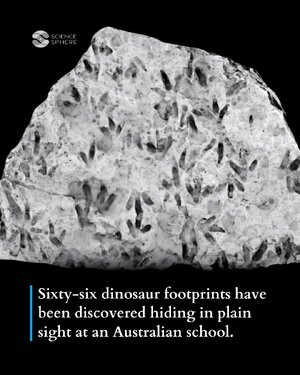
A slab of rock containing 66 fossilized dinosaur footprints, dating back 200 million years to the early Jurassic period, has been discovered at an Australian school in Queensland.
The rock had been largely unnoticed for 20 years, gathering dust in the foyer, until the school asked paleontologist Anthony Romilio to examine the three-toed track marks. Romilio, from the University of Queensland, stated that the slab displays "one of the highest concentrations of dinosaur footprints" ever found in Australia, offering an "unprecedented snapshot of dinosaur abundance, movement, and behavior" from a time when no fossilized dinosaur bones have been found in Australia.
The footprints belong to Anomoepus scambus, a small, two-legged plant-eater. The discovery highlights that significant fossils can remain unnoticed for years and that dinosaur fossils are often found by non-paleontologists. Romilio's research also led to the discovery of a two-tonne boulder with a dinosaur fossil marking the entrance to a coal mine car park.
The findings have been published in the journal Historical Biology.
RESEARCH PAPER

Anthony Romalio et al., "Dinosaur footprints from the Lower Jurassic (Hettangian–Sinemurian) Precipice Sandstone of the Callide Basin, Queensland, Australia", Historical Biology (2025)








 www.zmescience.com
www.zmescience.com